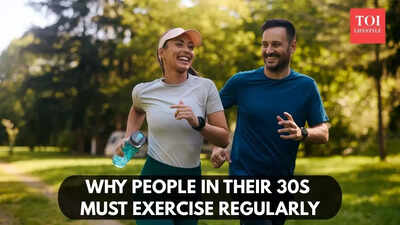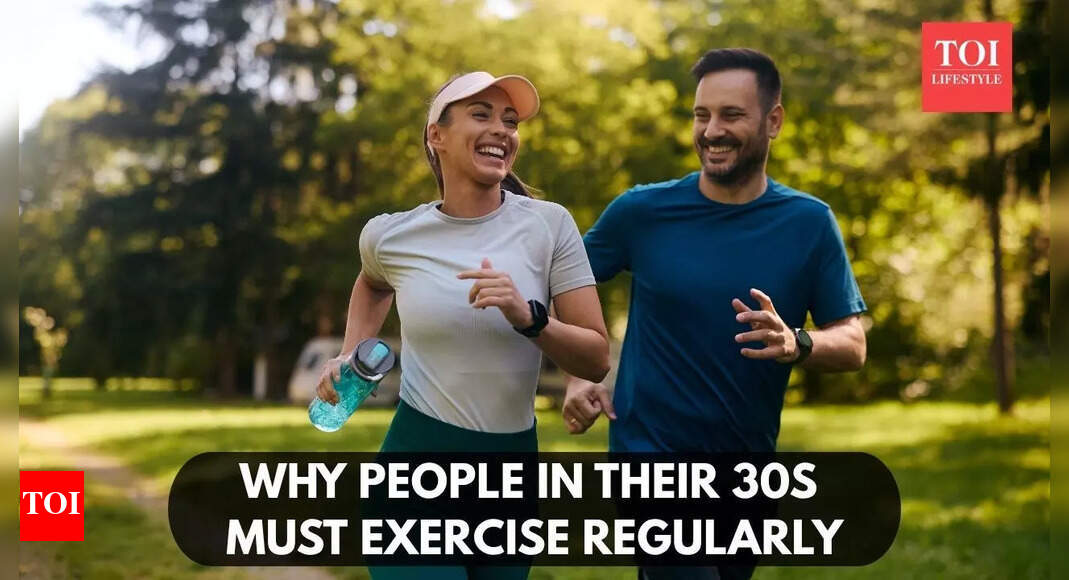 An ER doctor warns that skipping exercise in your 30s and 40s can lead to severe consequences. A sedentary lifestyle can cause osteoporosis, making bones fragile. One patient’s femur snapped in half while simply standing up, highlighting the critical need for consistent physical activity to maintain bone and muscle strength for future resilience. Are you in your 30s or 40s? Do you always tend to find an excuse to skip exercise? Well then, this is your sign to break that pattern. Be consistent with your exercise, or the price you will have to pay is huge. In a video shared on Instagram, Dr Jeff Yoo, a board-certified ER doctor based in Vancouver, sounds the alarm on what happens when you skip exercise in your 30s and 40s.
An ER doctor warns that skipping exercise in your 30s and 40s can lead to severe consequences. A sedentary lifestyle can cause osteoporosis, making bones fragile. One patient’s femur snapped in half while simply standing up, highlighting the critical need for consistent physical activity to maintain bone and muscle strength for future resilience. Are you in your 30s or 40s? Do you always tend to find an excuse to skip exercise? Well then, this is your sign to break that pattern. Be consistent with your exercise, or the price you will have to pay is huge. In a video shared on Instagram, Dr Jeff Yoo, a board-certified ER doctor based in Vancouver, sounds the alarm on what happens when you skip exercise in your 30s and 40s.
Why not exercising in your 30s and 40s is a bad idea
The best thing you can do for yourself, especially if you are an adult in your 30s or 40s, is to invest in health. Regular exercise is not just about how you look; it can significantly affect your quality of life. Dr Jeff emphasises that these are critical decades in your life. So, the consequences of skipping exercise are more severe than you might imagine.
10 Calcium-rich foods for your bones
‘If you don’t exercise regularly, this X-ray might convince you to change your ways,’ the doctor said. He recalled a 58-year-old woman who was brought to the emergency room a few weeks ago. ‘She lived a very sedentary lifestyle and rarely exercised. She was diagnosed with osteoporosis in her mid-40s and was prescribed medication to slow down the bone thinning, but even with this, she never started exercising,’ he explained.But the woman didn’t really know the price she would be paying for that. ‘On the day that she came in, she was at a restaurant with her husband feeling totally fine. She stood up from the table and pivoted to pick up her purse off the table, and both of them heard a loud snap, and they described it like a tree branch had snapped, and then she collapsed on the ground. She wasn’t able to walk, and when I came to see her in the ER, she was just constantly moaning in pain.’
A shocking diagnosis
The woman was screaming at the top of her lungs when she was brought to the ER. Dr Jeff ordered an X-ray, and what he found was shocking. ‘This is her femur, the strongest bone in the human body, snapped in half,’ he said.Yes, that’s right. The femur broke. This incident emphasises the crucial role of exercise, especially in middle age. ‘Your peak bone density happens in your mid-20s, and when you hit 30, if you aren’t consistently loading your muscles and your bones through weights, bodyweight exercises or bands, your rate of bone breakdown will outpace your rate of bone growth. And this is how osteoporosis develops. Your bones become weak and fragile, almost like chalk. This bone thinning can start silently in your 30s and 40s, and by the time you notice, just like my patient, it might already be too late,’ the doctor said.‘You can think of bones and muscles as a metaphor for life. You need stress to get stronger. Too little stress, you become weak. Too much stress, you’ll break. So don’t avoid stress. Apply it in the right amounts consistently to make yourself more resilient for the future,’ he added.The World Health Organization (WHO) recommends getting at least 150 minutes of moderate-intensity aerobic activity per week or 75 minutes of vigorous-intensity activity, plus muscle-strengthening activities twice a week. For moderate exercise, you can try brisk walking, water aerobics, riding a bike, dancing, doubles tennis, pushing a lawn mower, hiking, or rollerblading. Vigorous exercise includes running, swimming, riding a bike fast or on hills, walking up the stairs, sports like football, rugby, netball, and hockey, skipping, aerobics, gymnastics, and martial arts. The NHS suggests that adults should get ‘some type of physical activity every day’. So, try to quit the sedentary lifestyle by incorporating some form of exercise every day.Note: The information provided in this article is for educational purposes only and is not intended as medical advice. Always consult a qualified healthcare professional before starting any new medication or treatment, or before changing your diet or supplement regimen.
